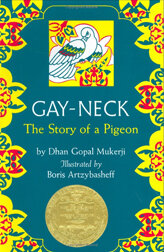The Legacy of a Newbery Winner from 1928
 I'm grateful to Pooja Makhijani for including my comments in her terrific article in The Atlantic on 1928 Newbery winner Dhan Gopal Mukerji. It made me think about how politics, the laws of nations, and the upheavals of history can disrupt the narratives of people's lives. We are restless beings, humans. Always have been, ever since the days we streamed out of Africa and ended up in the remotest corners of the planet. Religion and politics, tyranny and dictatorships have tried to contain us, sometimes successfully. Sometimes we have managed to burst out from behind the restraints they've tried to impose. Sometimes only poets, artists, and novelists have the courage to speak the truth.In 1928, when Dhan Gopal Mukerji went to receive his Newbery medal, he had to hide behind a stand of trees. The award had to be kept secret until the announcement. In a crowd of white librarians, his presence would have given away his status as the winner.In our time, you'll find a good number of brown-skinned attendees at the Newbery awards announcements. Yet surprisingly, few of the well-informed, highly educated people at those gatherings today will have even heard of Dhan Gopal Mukerji. Makhijani writes:
I'm grateful to Pooja Makhijani for including my comments in her terrific article in The Atlantic on 1928 Newbery winner Dhan Gopal Mukerji. It made me think about how politics, the laws of nations, and the upheavals of history can disrupt the narratives of people's lives. We are restless beings, humans. Always have been, ever since the days we streamed out of Africa and ended up in the remotest corners of the planet. Religion and politics, tyranny and dictatorships have tried to contain us, sometimes successfully. Sometimes we have managed to burst out from behind the restraints they've tried to impose. Sometimes only poets, artists, and novelists have the courage to speak the truth.In 1928, when Dhan Gopal Mukerji went to receive his Newbery medal, he had to hide behind a stand of trees. The award had to be kept secret until the announcement. In a crowd of white librarians, his presence would have given away his status as the winner.In our time, you'll find a good number of brown-skinned attendees at the Newbery awards announcements. Yet surprisingly, few of the well-informed, highly educated people at those gatherings today will have even heard of Dhan Gopal Mukerji. Makhijani writes:
...90 years on, this once-celebrated book, which has remained in print since its publication, is rarely mentioned in discussions of racial and ethnic diversity in books for kids, as if Mukerji were some sort of aberration rather than an early chapter of what could have been.
Had the immigration laws not clamped down upon Asians after 1917, Pooja asks, what would books for children look like in the United States today? We may as well ask, what would society look like? Might it be kinder, more inclusive? The story of the bicultural Yuba City families, too, (of which my novel, Step Up to the Plate, Maria Singh is a fictional rendering), is largely forgotten. We seem to want to erase the complications of the past, instead of learning from them.Children's books constitute an important layer of self for every literate adult. The fuses they light burn long into the future. The rise of xenophobia in American society suggests that we desperately need the adults of tomorrow to be endowed with rich imaginations, empathy for others, and the will to overcome petty differences. Acknowledging and honoring the history of our own field can only help us give tomorrow's adults the gifts that writers are uniquely able to offer--foresight, intuition, the long view, compassion.